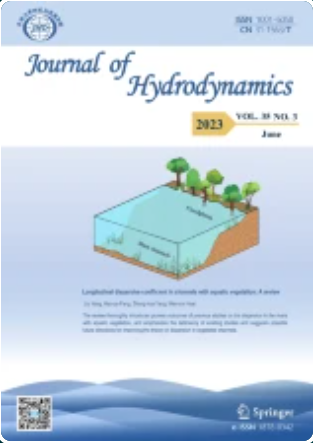Investigations of the dynamical behaviors of a millimeter-scale cavitation bubble near the rigid wall
Abstract
The collapse of the cavitation bubble near the rigid wall emits shock waves and creates micro-jet, causing cavitation damage and operation instability of the hydraulic machinery. In this paper, the millimeter-scale bubble near the rigid wall was investigated experimentally and numerically with the help of a laser photogrammetry system with nanosecond-micron space-time resolution and the open source package OpenFOAM-2212. The morphological characteristics of the bubble during its growth phase, collapse phase and rebound phase were observed by experiment and numerical simulation, and characteristics of the accompanying phenomena including the shock wave propagation and micro-jet evolution were well elucidated. The numerical results agree well with the experimental data. The bubble starts from a tiny small size with high internal pressure and expands into a sphere with a radius of 1.07 mm for γ = d / Rmax = 1.78. The bubble collapses into a heart shape and moves towards to the rigid wall during its collapse phase, resulting in a higher pressure load for the rigid wall in the second collapse. The maximum pressure of the shock wave of the first bubble collapse phase reaches 5.4 MPa, and the velocity of the micro-jet reaches approximately 100 m/s. This study enriches the existing experimental and numerical results of the dynamics of the near-wall cavitation bubble.

 求助内容:
求助内容: 应助结果提醒方式:
应助结果提醒方式:


